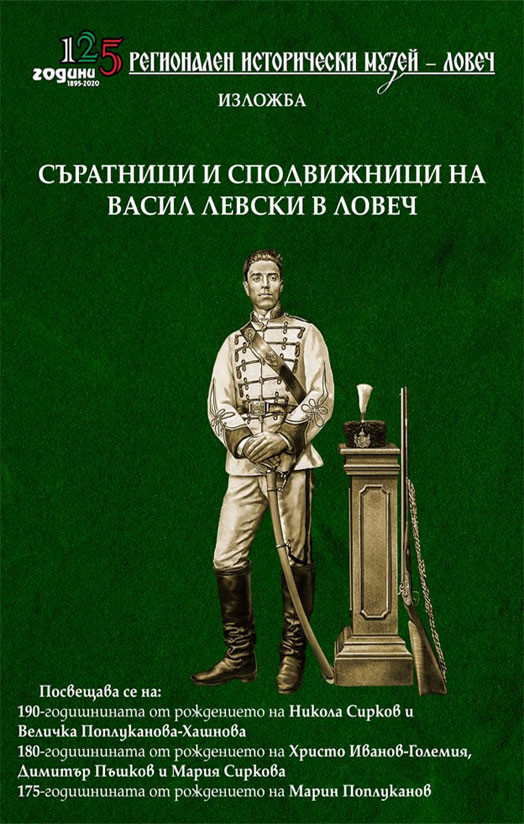February 19 is the date on which we bow our heads down and remain silent for a minute to pay respect to the glorious cause and commemorate the heroic demise of one of the greatest guardians of Bulgarian freedom – Vasil Ivanov Kunchev - Levski. 147 years have passed since the dark winter day when the gallows were erected on the outskirts of the city of Sofia. And with each passing year, instead of forgetting, we seem to add even more evidence to the great truth in the words of the Apostle of Freedom and his just deed.
Levski would forever remain at the age of 35 but everything he said during his lifetime is known and repeated by generations of Bulgarians. Today, we want to get closer and know more about the human nature of the Apostle of Freedom. That is why we visit his native house in Karlovo, bring flowers in front of his monument in Sofia, and walk the path of the Bulgarian Golgotha - from the inn in the village of Kakrina, where Levski was captured, to the town of Lovech, where the trial against him started as he was declared a dangerous enemy to the Ottoman Empire.
 The richest collection of personal belongings and documents of the Apostle is kept at the Vasil Levski Museum in Lovech. Among the 6,000 exhibits visitor could see Vasil Levski's personal weapon, as well as belongings of his closest associates in the fight for National Liberation. The museum dedicated to the Bulgarian Apostle of Freedom is of big national importance and naturally it is one of the symbols of the city of Lovech.
The richest collection of personal belongings and documents of the Apostle is kept at the Vasil Levski Museum in Lovech. Among the 6,000 exhibits visitor could see Vasil Levski's personal weapon, as well as belongings of his closest associates in the fight for National Liberation. The museum dedicated to the Bulgarian Apostle of Freedom is of big national importance and naturally it is one of the symbols of the city of Lovech.
"Exhibitions dedicated to Vasil Levski are held constantly in Lovech, but the idea behind the current exhibition is presenting some of Levski's associates," says Theodor Tonchev, head curator at the Regional Museum of Lovech.
"It is here where Levski established the Internal Revolutionary Central Committee in Bulgaria. More than 30 citizens of Lovech were involved in the work of the Lovech Committee. In this exhibition we have presented 14 of them. We have put on display photo posters in A3 format showing photos of Levski's companions and biographical data. In a letter of February 19, 1872, Levski addressed the members of the Revolutionary Committee, saying,‘... your names would remain forever in our national history. Just work diligently.’ This is a fulfilled prophecy, because the names of the people who fought for freedom together with Levski are inscribed in golden letters on the pages of history. Streets, kindergartens, and museums have been named after them in order to recall of their lives and deeds.”
147 years after the death of Levski, a rich program of commemorative events has been organized in Lovech with the participation of all cultural institutions. The culmination of the program is a procession to the Kakrina inn – the place where on December 28, 1872 Vasil Levski was captured. Today, the only "witness" to the historical events in the inn's yard is the centuries-old elm tree still standing there. Struck by a storm in 1997, its trunk had been strengthened through conservation and restoration works, in order to be a reminder of the heroic deeds of the Apostle and his struggle for a free and independent Bulgaria.
English: Alexander Markov
From 31 January 2025, the first podcast about Bulgarian Orthodox communities abroad - Bridge of Faith - will be launched. The concept is the brainchild of the team of the Bulgarian National Radio's (BNR) overseas programme - Radio Bulgaria, and is being..
It is 131 years since the birth of Tsar Boris III, dubbed unifier. Boris Saxe-Coburg-Gotha found himself at the head of Bulgaria after the abdication of Tsar Ferdinand after the defeat of the country in World War I. The young monarch was crowned..
The ancient city Heraclea Sintica is among Bulgaria's most attractive tourist sites presented at international tourist exhibitions in Vienna and Stuttgart , Katya Stoyanova, head of the project "Restoration, conservation and socialization of Heraclea..

+359 2 9336 661
